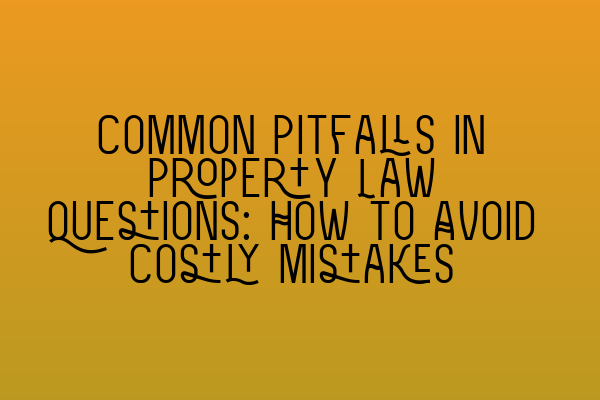Common Pitfalls in Property Law Questions: How to Avoid Costly Mistakes
At SQE Property Law & Land Law, we understand that property law can be complex and navigating through its intricacies can be a challenging task. Whether you are a student preparing for the SQE examination or a legal practitioner dealing with property law cases, it’s crucial to be aware of the common pitfalls that can lead to costly mistakes. In this blog post, we will discuss some of these pitfalls and provide you with tips on how to avoid them.
1. Failure to conduct thorough due diligence:
One of the biggest mistakes in property law is the failure to conduct thorough due diligence. This includes investigating the title, checking for encumbrances, reviewing planning permissions, and conducting searches. Without proper due diligence, you could end up purchasing a property with hidden issues, such as legal restrictions or outstanding debts. It’s essential to take the time to gather all the necessary information before proceeding with any property transaction.
2. Ignoring the importance of written agreements:
Property transactions often involve multiple parties, and it’s crucial to have written agreements in place to protect your rights and interests. Verbal agreements or handshake deals are not legally binding and can lead to disputes and costly litigation down the line. Always ensure that all agreements related to property transactions are clearly documented and signed by all parties involved.
3. Failing to consider tax implications:
Property transactions can have significant tax implications, and failing to consider these can lead to unexpected financial burdens. It’s important to consult with a tax expert to understand potential tax obligations, such as stamp duty, capital gains tax, or VAT. Proper tax planning can help you minimize your tax liabilities and avoid any legal issues in the future.
4. Inadequate consideration of lease terms:
Lease agreements can be complex, and failing to carefully review and consider lease terms can be a costly mistake. It’s essential to understand the obligations and restrictions outlined in the lease, such as maintenance responsibilities, rent reviews, and break clauses. Ignoring or misunderstanding these terms can lead to financial and legal consequences.
5. Overlooking planning and zoning regulations:
When dealing with property, it’s vital to familiarize yourself with planning and zoning regulations. Failure to comply with these regulations can result in penalties, costly delays, or even the inability to proceed with your intended use of the property. Always ensure you are aware of any restrictions or permits required for your proposed use or development of the property.
6. Improper handling of boundary disputes:
Boundary disputes can arise in property transactions, and they can be complicated and costly to resolve. It’s essential to properly identify and clarify property boundaries before entering into any transaction. Seek professional assistance from land surveyors or legal experts if you encounter any boundary issues to ensure a smooth and legally sound resolution.
Remember, property law is a specialized field, and seeking professional advice is always recommended. At SQE Property Law & Land Law, we have a team of experienced solicitors who can assist you with any property law questions or concerns you may have.
By avoiding these common pitfalls, you can minimize the risk of costly mistakes and ensure a successful property transaction. If you require further guidance or want to test your knowledge on other legal areas, we invite you to explore our related articles:
– Understanding Contractual Capacity: Rights and Limitations
– Interactive SQE Mock Tests for Contract Law: Test Your Knowledge
– Join Our SQE Contract Law Webinars: Expert Insights and Guidance
– SQE Prep: Mastering the Essentials of Contract Law
– Contractual Capacity: Understanding Legal Competence in Contracting Parties
We hope this blog post has provided you with valuable insights on how to avoid costly mistakes in property law. If you have any questions or seek further assistance, please don’t hesitate to contact SQE Property Law & Land Law. We are here to help you succeed in your property law endeavors!
